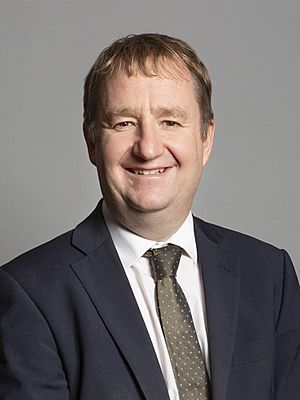Nigel Mills facts for kids
Quick facts for kids
Nigel Mills
|
|
|---|---|

Official portrait, 2019
|
|
| Member of Parliament for Amber Valley |
|
| In office 6 May 2010 – 30 May 2024 |
|
| Preceded by | Judy Mallaber |
| Succeeded by | Linsey Farnsworth |
| Personal details | |
| Born | 1974 (age 51–52) Jacksdale, Nottinghamshire, England |
| Political party | Conservative |
| Residences | Oakerthorpe, Derbyshire, England London, England |
| Alma mater | Newcastle University |
Nigel John Mills was born in 1974. He is a British politician. He used to be an accountant. He was a Member of Parliament (MP) for Amber Valley in Derbyshire. He served from the 2010 general election until the 2024 general election. He is a member of the Conservative Party. He supported the pro-Brexit group called Leave Means Leave. This group wanted the UK to leave the European Union.
Contents
Early Life and Education
Nigel Mills was born in Jacksdale, Nottinghamshire, in 1974. He went to a private school called Loughborough Grammar School. This school is in Leicestershire. After school, he studied Classics at Newcastle University.
In 1999, Nigel Mills became a qualified Chartered accountant. He worked for a company called PricewaterhouseCoopers. He stayed there until 2010. Then, he moved to Deloitte. At Deloitte, he advised businesses on tax matters. He specialized in how companies transfer money between different parts of their business.
Becoming a Politician
Nigel Mills started his political career in local government. In 2004, he was elected as a Conservative Councillor. He represented the Shipley Park, Horsley, and Horsley Woodhouse ward. This was for the Amber Valley Borough Council. He was re-elected in 2008. He later resigned from this role when he became an MP. He also served as a Town Councillor for Heanor and Loscoe.
In the 2010 general election, he was first elected as an MP. He won the seat for Amber Valley in Derbyshire. He won by a small number of votes, with a majority of 536.
Working in Parliament
During a break from Parliament in 2011, Nigel Mills volunteered. He worked with Voluntary Service Overseas in Tajikistan. His work aimed to help businesses grow there. This would create more jobs for people who needed them. He volunteered in Tajikistan again in 2012. He advised the government on how to attract more investments. This would also help create jobs.
In October 2011, Nigel Mills voted for a public vote. This vote was about Britain staying in the European Union. In August 2013, he voted against a government plan. This plan was about possible British action in Syria.
In December 2014, Nigel Mills was seen playing a game. He was playing Candy Crush on his iPad. This happened during a Work and Pensions Committee meeting. He later apologized for playing the game. He said he would try not to do it again.
He kept his seat in the 2015 general election. He also won again in the 2017 general election.
Nigel Mills was a member of several important committees. These included the Work and Pensions Select Committee. He was also on the Northern Ireland Affairs Select Committee. He served on the Immigration Bill Committee too.
In the 2019 general election, he won his seat again. He increased his share of the votes. He won Amber Valley with a large majority of 16,886 votes.
In the 2024 United Kingdom general election, Nigel Mills lost his seat. Linsey Farnsworth from the Labour Party won instead. His vote share dropped significantly in that election.
Life Outside Politics
Nigel Mills was previously in a relationship with Gillian Shaw. She was also a Conservative candidate for Amber Valley. She passed away from cancer in 2006. In January 2013, he became engaged to Alice Elizabeth Ward. They got married in September 2013.
He lives in Oakerthorpe in Derbyshire. He also has a home in London. He is a big fan of football. He has a season ticket for Notts County F.C.. He is also a member of Nottinghamshire County Cricket Club.
Awards and Recognition
In November 2013, Nigel Mills received an award. He shared The Spectator's Parliamentarian of the Year Award. He shared it with 14 other MPs. They received the award for voting against stricter rules for newspapers. Their vote was to protect the freedom of the press.
 | Georgia Louise Harris Brown |
 | Julian Abele |
 | Norma Merrick Sklarek |
 | William Sidney Pittman |

